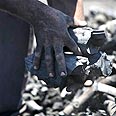
In adapting to years of border blockades and shortages, Palestinians in Gaza have become experts at recycling and making new out of old. That includes turning scrap wood into charcoal being used for barbecue grills and water pipes in local restaurants and coffee houses.
Wood is not in ample supply in the sandy coastal strip where a rapidly growing population, now at 1.7 million, is steadily gobbling up the remaining open spaces.
Fayez Abu Jobain and his seven employees first started producing charcoal in 2004, using trees the Israeli military had cut down in rural areas to deprive Gaza terrorists of cover when they fired their rockets toward Israel.
Since then, Abu Jobain and other charcoal producers have been adapting repeatedly to changing political circumstances.
When Israel and Egypt imposed a tight closure on the territory in 2007 in response to the takeover by the Islamic terror group Hamas, the charcoal-makers used scrap wood brought into Gaza from Egypt through smuggling tunnels. Since then, both Israel and Egypt have eased the closures, and some of the wood needed for charcoal-making is even imported legally.
Trees cut down to make way for more homes are another source of cheap wood, said Abu Jobain, 50.
Citrus trees work best for charcoal, but are very expensive, so Abu Jobain uses old olive trees and other types instead.
He said wood sticks are sorted, arranged in a pyramid shape, buried in the sand and allowed to smolder for days. Workers regularly moisten the wood to slow down the burning, he said.
He said his workshop can produce 4 tons of charcoal a week and that he makes 50 cents profit on a kilogram (2.2 pounds), which sells for $2. In all, there are eight charcoal workshops in Gaza, he said.















